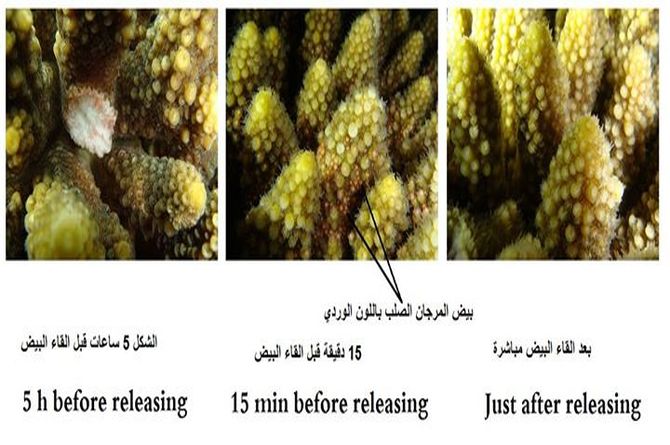Scientific breakthrough
HEPCA’s scientific research team headed by Professor Mahmoud Hanafy and Dr Mohammed Kotb, associated with two researchers from the Nature Conservation Sector of the Egyptian Environmental Affairs Agency (EEAA) Mr. Tamer Monir and Mr. Islam El Sadek had the opportunity to study a remarkable mass spawning involving Acropora species, a group of common hard corals, occurred a few days ago. This was the first scientific observation ever done in the Egyptian Red Sea! Mass spawning is an event of synchronized reproduction described in the mid-1980s and aiming at maximizing chances of fertilization: the coral colonies would release in the water their gametes (eggs and sperm) in large quantity, simultaneously and over a very limited time interval, the coordination of the release dependent on environmental, biological and chemical factors. The event is known to occur only in tropical areas and is usually associated with the full moon. Information available from the Egyptian Red Sea is a result of a decade of studies carried out by various researchers and institutes. This data was collected and analyzed by HEPCA team, who came into the conclusion that the mass spawning takes place either two days before or after the full moon, usually in the period between 20th of April and the 6th of May. Their conclusion was correct: a unique and remarkable mass release of gametes from more than 12 species of hard corals took place on Thursday the 3rd and Friday the 4th of May 2012 in Hurghada area. And there is something more: HEPCA team’s genuine excitement in witnessing this phenomenon can possibly be shared as, and this is the real breakthrough, recorded video. Beside the undeniable value of disclosing a fascinating ecological process in front of our eyes, the scientific significance of such a record can greatly contribute towards preparing and implementing integrated environmental management plans for the preservation of the marine environment. The sector of coral reef rehabilitation would benefit from it too; perhaps finding new resources to intervene on the deteriorated Hurghada’s coral reefs, heavily impacted by unregulated coastal development. Finally, with a close collaboration between environmental organizations, agencies and the tourism sector, our divers could even be among the first to be offered the possibility to observe the event live underwater. In conclusion, if last week you were concerned about the fact that the sea was clouded by an unidentified reddish substance, you now know there is no reason to worry. On the contrary, celebrate the magnificent natural event you had a glimpse of! As usual, we call upon the community to respect coral reefs by adopting proper behaviors and to report to HEPCA any violations to national and regional regulations you may witness at sea.



